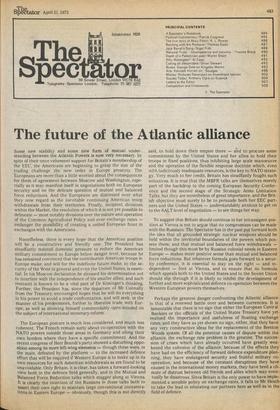The future of the Atlantic alliance
Some new stability and some new form of mutual understanding between the Atlantic Powers is now very necessary. In spite of their once vehement support for Britain's membership of the EEC, the Americans are beginning to grasp the size of the trading challenge the new order in Europe presents. The 'Europeans are more than a little worried about the consequences for them of agreement between Moscow and Washington, especially as it may manifest itself in negotiations both on European security and on the delicate question of mutual and balanced force reductions. And the Europeans are distressed over what they now regard as the inevitable continuing American troop withdrawals from their territories. Finally, incipient divisions within the Market, the resolution of which it is not yet possible to delineate — most notably divisions over the nature and operation of the Common Agricultural Policy and over exchange rates — endanger the possibility of creating a united European front in exchanges with the Americans.
Nonetheless, there is every hope that the American position will be a constructive and friendly one. The President has steadfastly resisted domestic pressure to reduce the American military commitment to Europe below danger level, because he has remained convinced that the contribution American troops in Europe make, and will for the indefinite future make, to the security of the West in general and even the United States, is essential. In his Moscow declaration he stressed his determination not to interfere with the independence of his smaller allies; and such restraint is known to be a vital part of Dr Kissinger's thinking. Further, the President has, since the departure of Mr Connally from the Treasury, encouraged hopes that he will do everything in his power to avoid a trade' confrontation, and will seek, in the manner of, his predecessors, further to liberalise trade with Europe; as well as showing himself commendably open-minded on the subject of international monetary reform.
The European posture is much less considered, and much less coherent. The French remain surly about co-operation with the NATO powers outside those areas in Germany and along their own borders where they have a specific commitment. And the recent congress of Herr Brandt's party showed a disturbing opposition among its more left-wing elements — though these were, in the main, defeated by the platform — to the increased defence effort that will be required if Western Europe is to make up in its own resources for such American withdrawals as are found to be unavoidable. Only Britain, it is clear, has taken a forward-looking view both in the defence field generally, and in the Mutual and Balanced Force Reduction talks which stagger along at Vienna. It is clearly the intention of the Russians in these talks both to assert their own right to maintain large conventional concentrations.in Eastern Europe — obviously, though this is not directly said, to hold down their empire there — and to procure some commitment by the United States and her allies to hold their troops in fixed positions, thus inhibiting large scale manoeuvre and the operation of the flexible response doctrine which, even with ludicrously inadequate resources, is the key to NATO strategy. Very much to her credit, Britain has steadfastly fought such initiatives. It is true that the MBFR talks are themselves merely part of the backdrop to the coming European Security Conference and the second stage of the Strategic Arms Limitation Talks, but they are nonetheless of great importance, and the British objective must surely to be to persuade both her EEC partners and the United States — understandably anxious to get on to the SALT level of negotiation — to see things her way.
To suggest that Britain should continue in her intransigent position at Vienna is not to argue that no compromises can be made with the Russians. The Spectator has in the past put forward both the idea that all grounded strategic nuclear weapons should be held within the territorial boundaries of the powers which possess them; and that mutual and balanced force withdrawals — limited though this must be by Russian colonial needs in Eastern Europe — makes more positive sense than mutual and balanced force reductions. But whatever formula goes forward to a security conference, it is essential to stay on the right — and independent — foot at Vienna, and to ensure that no formula which appeals both to the United States and to the Soviet Union should slip through if it is likely to inhibit the development of further and more sophisticated defence co-operation between the Western European powers themselves.
Perhaps the greatest danger confronting the Atlantic alliance is that of a renewed battle over and between currencies. It is lamentable that there is no sign that either the European Central 'Bankers or the officials of the United States Treasury have yet, realised the importance and usefulness of floating exchange rates; and they have as yet shown no sign, either, that they have any very constructive ideas for the replacement of the Bretton Woods system. Of all the potential causes of dispute within the alliance, the exchange rate problem is the greatest. The succession of crises which have already occurred have greatly weakened the cohesion of the alliance; because of the effects they have had on the efficiency of forward defence expenditure planning, they have endangered security and fruitful military cooperation; and because of the constant disruptions they have caused in the international money markets, they have bred a climate of distrust between old friends and allies which may eventually be disastrous. Since Britain is the only power to have implemented a sensible policy on exchange rates, it falls to Mr Heath to take the lead in educating our partners here as well as in the field of defence.


































 Previous page
Previous page